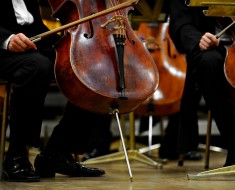Two vibrantly alive concerts this week.
The first one was in Birmingham, with the city’s superb orchestra giving an expansive performance of Mahler’s Fifth symphony under their chief conductor, Andris Nelsons on Wednesday. The second was yesterday in Bristol, the Bournemouth Symphony Orchestra, with an interesting programme of Britten, Beethoven and Rachmaninov under their permanent chief, Krill Karabits, who, still fairly new in his appointment, is in convincing command of his players.
It felt a bit like a tale of two conductors, both seen from the vantage point of a seat in the choir overlooking the orchestra. Nelsons was crouching over his team like a tiger waiting to pounce, and then pouncing indeed with enormous vigour. An athletic display. Karabits is more elegant, but equally living the music in every part of his being. The rapport between conductor and players in both orchestras, was a convincing marriage of talents, and quite apart from the result, a privilege to see.
The heart of yesterday’s concert was Beethoven’s Fourth Piano Concerto played by the incomparable Paul Lewis (see blog 05.05.08). He performed all five at last summer’s Prom concerts (see blog 06.08.10) and perhaps that was one reason why there was unusually big audience in the Colston Hall last night. He was interviewed before the concert and talked about his commitment to Beethoven over the last few years, which will end in Spain next week when he will be performing all five with the Orquesta Sinfonia de Galicia. He will be playing the first and the fifth at one concert and the remaining three at another, a marathon he has never attempted before. His future performances will concentrate on the mature works of Schubert. Last night’s performance was spell-binding. I was just so glad to be there and to hear such music (one of my very favourite concertos) as if it was being created for the first time and with sensitive support from the orchestra.
The cadenzas!
The surprise of the evening was the Benjamin Britten work, composed as one of several commissions by Japan to mark the 2,600th anniversary of the founding of the Japanese empire. That Britten, a pacifist residing in the U.S.A., took the commission is odd – this after Japan had invaded China and then Russia at the end of the 1930’s, but that Japan refused to accept it because of its religious overtones, less so. It’s an astonishing work, reminding me of Shostokovich at his most imaginative, and was given a passionate and precise performance by the orchestra at the top of it’s form. Full of conflict until its quiet ending, it was a revelation to me, and I look forward to hearing it again.
B.R.



